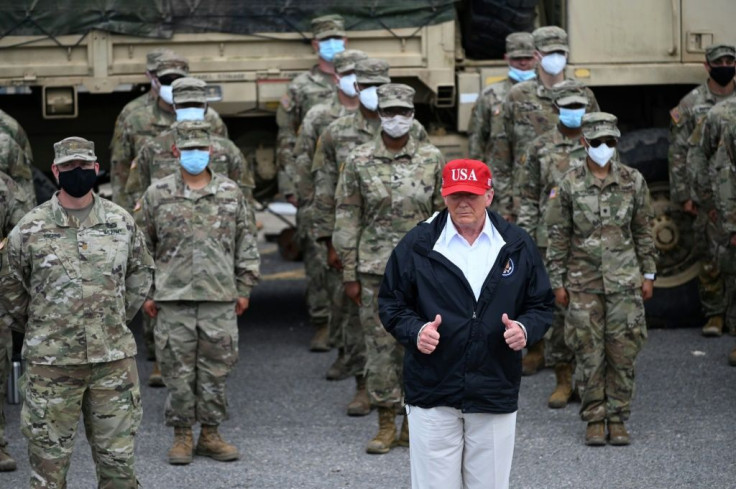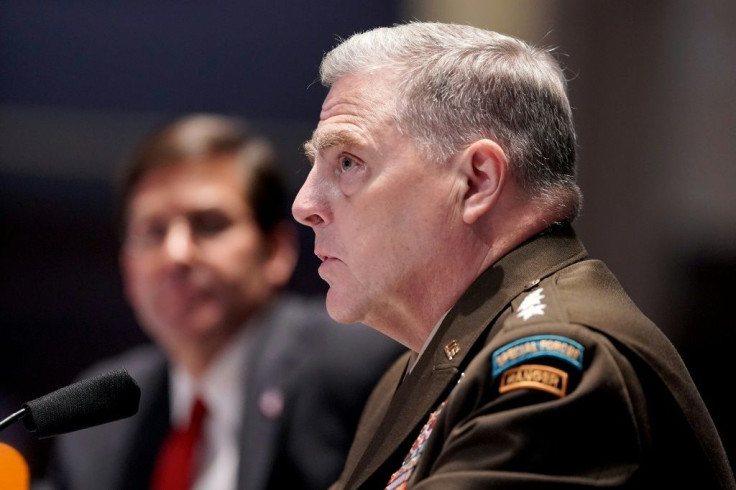National Guard Units On Standby In Arizona, Alabama To Quell Protests Against Racial Violence
KEY POINTS
- Hundreds of military police officers will be stationed in Arizona and Alabama to assist with quelling any unrest that occurs
- They can deploy to anywhere in the U.S. within 24 hours, and are intended to combat the protests that occur in response to incidents of racially motivated police brutality
- Less clear is how they might respond to unrest around the presidential election, which could be contested and lead to widespread demonstrations
The National Guard has put troops on standby throughout Arizona and Alabama to quell civil unrest over racial violence. Reuters cites three anonymous sources that say 600 military police officers were stationed in the South after the protests following the killing of George Floyd by police.
The National Guard deployed 62,000 troops in June to help quell those protests. President Donald Trump has repeatedly called for the National Guard or even the U.S. Army to quash peaceful protestors. Trump used federal police to clear protestors near the White House to conduct a photo op, tear-gassing a medical tent near St. John’s Church.
Trump has also alleged that Seattle mayor Jenny Durkan only cleared out protestors because he threatened to do so with federal troops. Durkan has contested this, saying that no such conversation occured. “It just never happened. I don’t know what world he’s living in,” she told the Washington Post.

The “rapid response units” were assembled in the last month and can deploy to any part of the country within 24 hours upon request by a state governor. They are expected to remain in place at least until the end of the year.
“We’re in very unique times right now in our country, we’ve seen several instances where civil disturbances escalated very quickly to riots, extensive property damage,” one of the unnamed officials said.
There is another possible source of civil unrest: the November presidential election. Donald Trump has consistently cast doubt on the legitimacy of any potential loss, alleging widespread voter fraud with zero evidence and telling the violent white supremacist Proud Boys to “stand by” during the last debate. He has also told his supporters to go to polling stations to act as ‘poll watchers,’ something his critics say is thinly veiled voter intimidation.
See posts, photos and more on Facebook.
The military has been hesitant to get involved in political operations. Mark Milley, Chairman of the Joint Chiefs of Staff, told lawmakers that he did not expect the military to get involved in the election or to resolve any disputes that may arise.
They have also generally avoided participating in protest suppression. Milley issued a public apology after appearing with Trump following the clearing of Lafayette square for the church photo op.
“I should not have been there. My presence in that moment, and in that environment, created the perception of the military involved in domestic politics,” he said.

The National Guard is seen as more palatable. While they do operate overseas, their primary focus is on assisting governors who need more personnel or equipment than their state-level operations can easily provide.
“We’ve shown that the National Guard is the optimal choice to support civil authorities ... to me it’s just a natural selection for us to utilize the National Guard,” said one of Reuter’s sources.
Should the election be contested, it might not be clear what exactly “supporting civil authorities” looks like. If widespread predictions of a contested election come to pass, along with the almost inevitable unrest that would follow, hundreds of heavily armed troops could find themselves facing difficult choices.
© Copyright IBTimes 2025. All rights reserved.





















